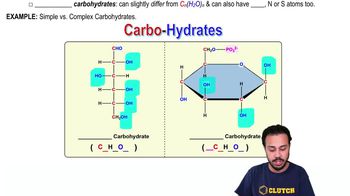A glucose molecule is to starch as (Explain your answer.)
a. A steroid is to a lipid
b. A protein is to an amino acid
c. A nucleic acid is to a polypeptide
d. A nucleotide is to a nucleic acid


 Verified step by step guidance
Verified step by step guidance



A glucose molecule is to starch as (Explain your answer.)
a. A steroid is to a lipid
b. A protein is to an amino acid
c. A nucleic acid is to a polypeptide
d. A nucleotide is to a nucleic acid
What makes a fatty acid an acid?
a. It does not dissolve in water.
b. It is capable of bonding with other molecules to form a fat.
c. It has a carboxyl group that can donate an H+ to a solution.
d. It contains only two oxygen atoms.
Cows can derive nutrients from cellulose because
a. They produce enzymes that recognize the shape of the glucose-glucose bonds and hydrolyze them.
b. They re-chew their cud to break down cellulose fibers.
c. Their digestive tract contains microorganisms that can hydrolyze the bonds of cellulose.
d. They convert cellulose to starch and can digest starch.